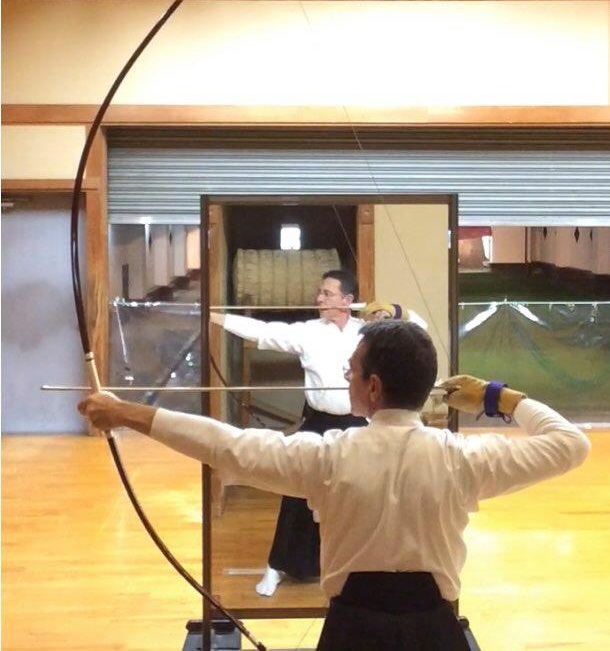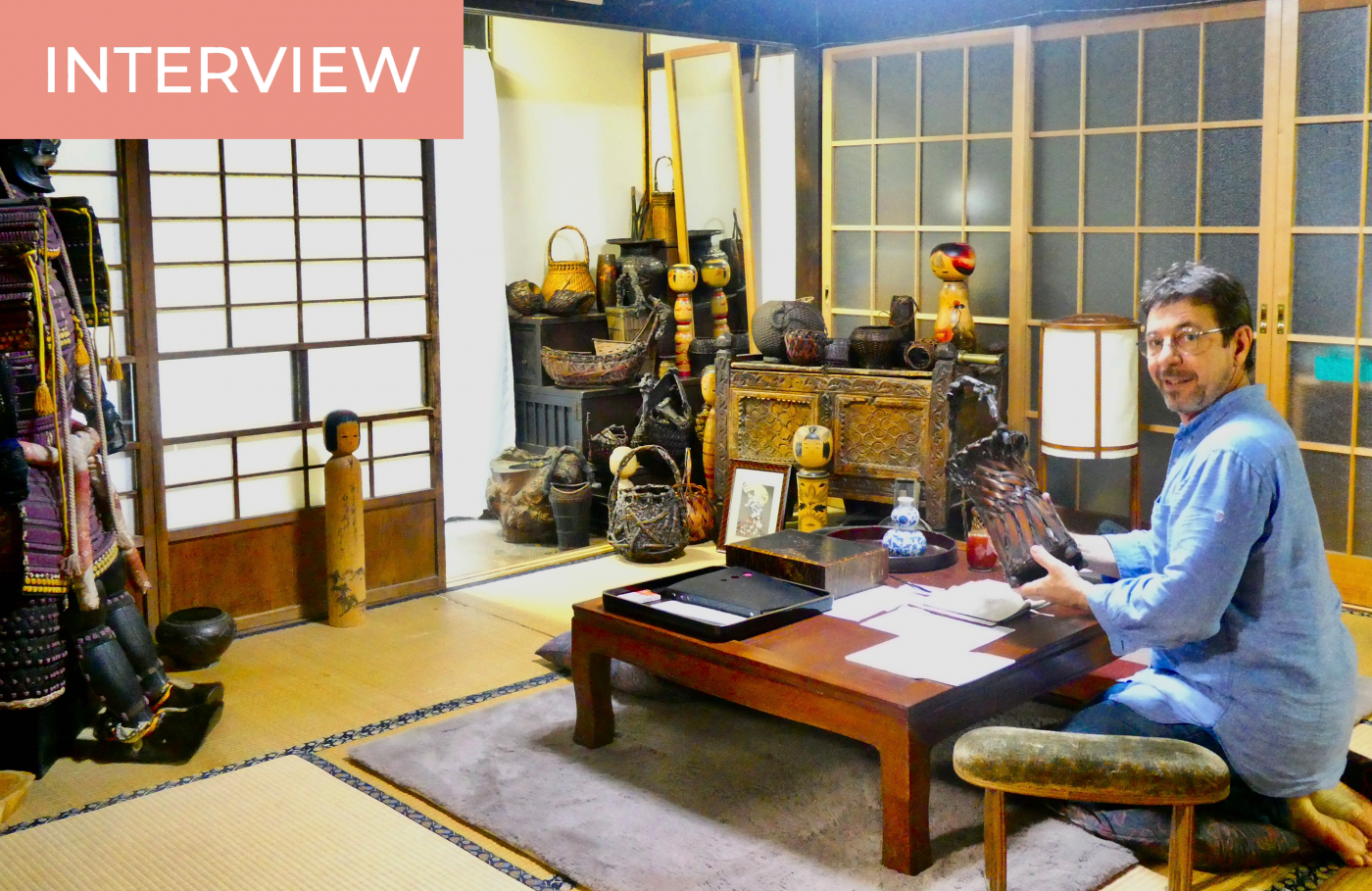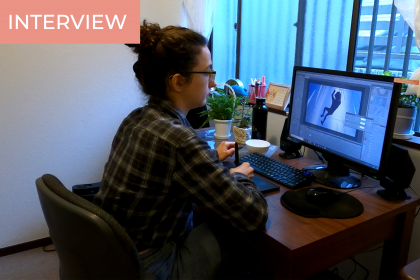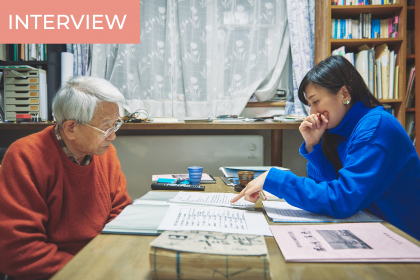Richard is a French national who has been living in Japan since 2015. At 58 years old, he is the kind of person who has lived several lives in a single life. He is the owner and cook of his own French restaurant in the Kagurazaka area of Tokyo, “le Moccot.” The restaurant’s name is a word in the Southern France dialect that means “ship pilot,” a reference to his previous job. Back in France, Richard used to take tourists on his own boat to show them the beauties of the Port-Cros and Porquerolles National Park. One day, a charming Japanese woman called Midori boarded the ship, and that was the starting point of Richard’s life in Japan.
An antiques enthusiast, Richard has accumulated an impressive collection of Japanese items over the years. But mostly, he has developed in-depth academic knowledge about particular objects, and an intuitive sense of the Japanese mind and aesthetics. Therefore, I have decided to interview him to know more about his developing side business involving Japanese antiques.
Could you please explain what your side business consists of?
I prepare batches of Japanese antique items to be sold in French auction houses and their online websites. I send the items, the auction houses’ experts will estimate the objects, and the auction houses will sell them.
The items I chose don’t interest the Japanese customers much because they are looking only for very high-quality products. For example, recently, I’m fond of collecting ikebana baskets [ikebana is the traditional Japanese floral arrangement]. In Japan, there are tons and tons of these baskets, so the Japanese collectors are only interested in the ones with superior quality. But in France, such baskets just don’t exist. French collectors appreciate them a lot because they are carefully handmade, they’re made of bamboo, and they look very exotic to them.
I also love wooden statues and Buddhist statues, which are very popular in France now. Other items I prepare are netsuke. These are button-like delicately carved items that are used to attach personal containers to the kimono. They were often made in precious materials such as ivory. After the Meiji Restoration, netsuke became popular in Europe, so the Japanese started making them specifically for the European market. However, the netsuke I choose are the ones Japanese people made for themselves. I also have a lot of kiseru [traditional Japanese pipes] and their tobacco containers. Usually, such items are destined to be exposed in display cases in the collectors’ homes.
What has led you to have this interest in the Japanese antiques business?
My idea is that if I love doing something but cannot afford to do it only for my own pleasure, then I turn it into a business. But in fact, I started dealing with antiques 35 years ago.
My interest in antiques was born when I was 12 years old. My father used to restore objects for antique dealers and I’d visit him in his workshop. He only restored big items, which was physically demanding, so later when he got sick, he had to stop this business. I had a look at his workshop, and when I opened crates, I found large brass objects, oil lamps…. Then at 23 years old I had to go to the military service, and the pay was meager. To get some side money, I started selling my father’s items at flea markets during my leaves. That allowed me to meet people, good friends I am still in contact with today.
A few years ago, I met Midori, who is now my wife. We met in France, but I came to visit her in Japan several times. The second time I came, I stayed for three months, and since Midori knew I loved antiques, she introduced me to flea markets and the like. Now I live here, I have my restaurant but also an antiques dealer’s license.
What are you committed to when you buy or sell antiques?
I have my own ethics. I don’t want to wrong people, especially since Japanese sellers are always very gentle with me. For example, I don’t want to buy a thing from a Japanese person for 5,000 yen and then sell it in France for 50,000 yen. Most of the time, that’s how business works, but that’s not how I work. Also, I only choose items that I personally like very much.
What are your projects for the future?
My projects are to work less and to do more of what I love! The recent global pandemic has affected my way of living and how I viewed my future projects.
Before the pandemic, I was working in my restaurant from Tuesday to Saturday, sometimes even Sundays. I was working from 5 p.m. and getting to bed at 2 a.m. The rest of the day, I would go to the museum or visit antique dealers. But I was always tired, and there was not so much time. So I only concentrated on my personal collection of kokeshi dolls, I have more than 350 of them.
Then the pandemic happened, and I self-isolated in the old house I rent in the countryside in Chiba Prefecture. It gave me a lot of time to think about what I would do after. Another project of mine just had fallen through, and things were not going well with my restaurant’s chef. I gave him an offer, but he preferred to quit.
In the end, I decided to work in the restaurant only during the three busiest days of the week and really enjoy it with my regular customers. The rest of the time I can spend in the house in Chiba: I chill, I tend my vegetable garden, and I take care of my antiques. I have made myself a mini studio where I can take pictures of the items I collect to send them to the auction houses.

Is there anything specific to the Japanese soul/culture/mind that you admire, or you have adopted?
When someone asks me a serious question, and the answer will engage me or commit my viewpoint, I don’t answer as impulsively as I used to. Now I’m more like the Japanese people: I answer without answering, or I delay my answer. I’ve come to realize that if someone asks you an important question, you owe them and yourself to take your time to think about it. When you don’t, not only are you not showing consideration, but you’re also making a fool of yourself. Before, my attitude was, “This is how I am. Take it or leave it.” But now, I adapt myself to my interlocutor more.
I also used to practice kyudo [traditional Japanese archery], and the Zen concepts that permeate it made me realize things I wasn’t conscious of before. Before, for me, “archery” meant “the objective is to hit the target.” After practicing kyudo, I realized that hitting the target can be very satisfying, but that’s not what it’s about. I’ve seen great kyudo masters miss the target in an elegant and majestic way. If what I feel inside myself is correct and my moves are beautiful, I don’t care about hitting the target anymore. Even when I’m the only Westerner competing in front of thousands of people. This kind of experience has led me to adopt a more detached and relaxed point of view towards all matters in life.
In your French culture, do you have a concept close to the Japanese “kokoro”?
In French, we have the word “coeur,” but you would have to look at the whole list of expressions including it to express all the meanings the single word “kokoro” conveys. For example, “il a bon coeur,” “he is good-hearted,” conveys the character. “Il a fait ça avec du coeur,” “he put his heart into it,” expresses the spirit and motivation… Maybe with a long list of such expressions, we would get close to the concept of kokoro from a French viewpoint.
To me, Richard is a good example of how life in Japan can change you without taking away your essence. He still keeps the passion and enthusiasm distinctive of a Southern France man of Italian descent, which he pours in his pursuit of peculiar objects. However, it is evident that living in Japan has changed his perception of goals and time. Being busy “hitting the target,” achieving things is not the priority anymore. Now is the time to take the time. Take the time to live, to do the things you love in the appropriate manner, the time to reflect, the time to show consideration and communicate better with others. I believe that consciously or not, Richard has adopted the Zen concept of “just doing.”




